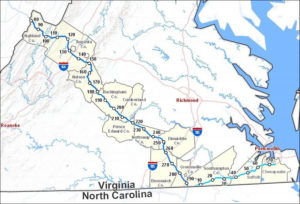I understand the motivations of landowners opposing the Atlantic Coast Pipeline. If I lived along the pipeline route, I’d be worried about the impact of construction on my drinking water, and I’d be upset that forest-clearing disrupted my pristine views. I appreciate their arguments that, with the rapid advance of solar power, wind power, and battery storage, maybe Virginia doesn’t need another gas pipeline. Reasonable people can disagree. What’s not reasonable is turning the ACP into a racial issue.
In their desperation to thwart pipeline construction, ACP foes have attacked the project on the grounds of “environmental justice.” ACP plans call for building a compressor station in the African-American community of Union Hill in Buckingham County. Raising the specter of noise and air pollution, the pipeline’s enemies have decried the “environmental racism” involved in the ACP’s siting decision. Governor Ralph Northam’s Advisory Council on Environmental Justice recommended that Northam suspend the issuance of permits to ensure that “predominantly poor, indigenous, brown and/or black communities do not bear an unequal burden of environmental pollutants and life-altering disruptions.”
DEQ issued Friday the final permits needed for construction of the 600-mile pipeline project to begin in Virginia, so the issue may be moot. But resentments stirred up by the charges may well linger. And the racism card, once played, likely will be played again in other contexts. Leftist militants have demonstrated that they are willing to use any tool — including the inflaming of racial grievances — to advance their goals.
It is worth asking to what degree the mostly white environmental activists actually speak for the racial minorities whose interests they purport to represent. Derrick Hollie, an African-American writing in the conservative Daily Signal, didn’t see many other African-Americans attending a recent anti-pipeline rally.
It was exclusively white activists with their matching T-shirts and picket signs who were speaking out against the proposed compressor station at a recent hearing, claiming it to be “environmental racism.”
Sometimes, it’s helpful for those with social power to stand up and speak for the disadvantaged—such as when Kim Kardashian used her clout to help free a grandmother with a life prison sentence for a minor drug conviction.
Instead, what I saw in Buckingham County reeked of a so-called “white savior complex.” At one point, I was verbally attacked by a white woman and told that I “should pray for forgiveness.”
As Hollie observes, African-Americans have ample reason to support the pipeline. Many are susceptible to falling into “energy poverty,” which occurs when energy prices rise, as they presumably would with natural gas shortages. Minorities also stand to benefit from access to the construction and pipeline maintenance jobs. And, Hollie could have added, if rural communities along the route succeed in recruiting new industry thanks to more abundant gas supplies, African-Americans have a shot at getting better-paying factory jobs. Pipeline foes have counters to each of those arguments, but that’s not the point. How can it be “environmental racism” if African-Americans are themselves divided on the merits of the project?
The Federal Energy Regulatory Commission (FERC) is required to look at environmental justice in its pipeline permitting process. The commission found that minorities along the 600-mile route are not disproportionately impacted. To be sure, when a pipeline passes through three states and 28 cities and counties with mixed racial populations, some minority communities will be impacted. In Virginia, however, the only significant instance appears to be Union Hill. The only way to avoid impacting any minority communities would be to restrict the path to white communities exclusively — thus institutionalizing racism in reverse.
The charge of environmental racism — that ACP deliberately didn’t merely impact African- Americans disproportionately but targeted them — is even more impossible to maintain. The ACP is a linear project that starts in Harrison County, W.Va., ends in Robeson County, N.C., connects with local gas-distribution systems at various points in between, and threads the needle through mountainous terrain, national forests, wildlife preserves, historical resources, cultural resources, and conservation districts — all the while traversing the shortest possible distance. ACP picked the Buckingham County site for its compressor station because it was near the intersection with the Transco Pipeline — not because it was the locale of an African-American community. Due to the reality of highly constricted options in mountainous terrain, ACP also is running the pipeline near the resort community of Wintergreen. Does anyone think ACP was targeting rich white people?
Why not re-route around Union Hill? Because adding another 30 miles or so of pipeline would… impact more people. The idea is to impact fewer property owners, not more. Instead, ACP created a community advisory group to develop a plan to reduce the noise and visual impact on Union Hill. The pipeline company will add sound and visual buffers around the compressor station, and it has agreed to air pollution controls that are tighter than for any other compressor station in the Commonwealth of Virginia.
The environmental issues associated with the pipeline are real. The economic issues are real. The racial issue is spurious. By raising it, pipeline foes bring discredit to themselves and the entire concept of “environmental racism.” Derrick Hollie may be generous in attributing the “white savior complex” to the white militants making a racial issue of the pipeline. That would imply their hearts are in the right place. To me, the gambit of white militants crying racism looks more like a cynical ploy by people willing to say and do anything.



